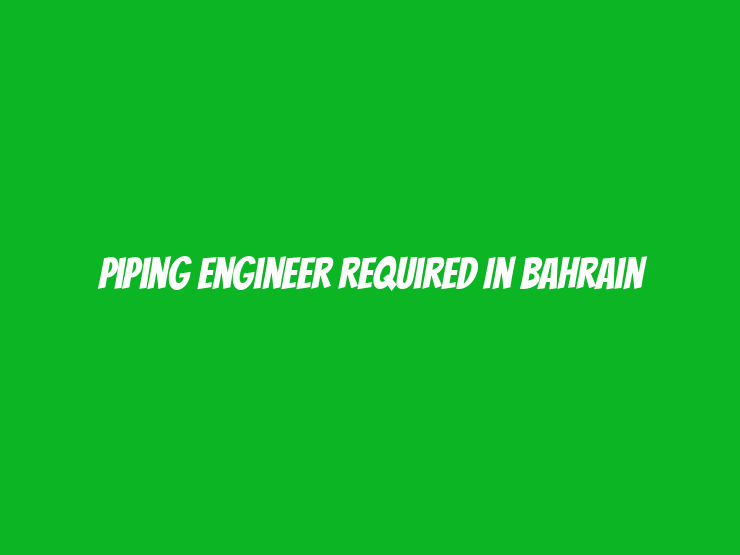A Piping Engineer is responsible for designing, planning, and overseeing the installation and maintenance of piping systems in various industrial sectors such as oil and gas, chemical processing, and power generation. Their work ensures the efficient transport of fluids or gases through piping systems while adhering to safety, environmental, and industry standards. The Piping Engineer collaborates with multidisciplinary teams, including mechanical engineers, construction teams, and project managers, to ensure the smooth execution of piping projects.
| Salary | Market Competitive |
| Experience | 2 – 4 Years |
| Location | Bahrain |
| Qualification | Bachelor of Technology/Engineering |
| Posted | 18 September 2024 |
| Job Type | Full-Time |
| Posted by | Habeebi Recruiter |
| last date to apply | apply within 15 days |
Key Responsibilities:
- Piping System Design and Layout: The primary responsibility of a Piping Engineer is to design piping systems that meet the functional, safety, and regulatory requirements of a project. This includes developing detailed piping layouts, specifying pipe materials, and determining the most efficient routing of pipes. Piping Engineers use advanced design software such as AutoCAD and PDS to create comprehensive designs that optimize system performance.
- Project Planning and Coordination: Piping Engineers are involved in the planning and execution phases of piping projects. They work closely with project managers, construction teams, and suppliers to ensure that the design specifications are met, timelines are adhered to, and materials are delivered on schedule. This includes creating detailed project plans, cost estimates, and resource allocation strategies to ensure projects are completed efficiently and within budget.
- Material Selection and Specification: Selecting appropriate materials for piping systems is a critical aspect of the Piping Engineer’s role. They must consider factors such as fluid characteristics, temperature, pressure, and environmental conditions to choose materials that ensure durability and safety. Piping Engineers also specify the types of valves, pumps, and fittings required for each project, balancing performance with cost-effectiveness.
- Safety and Compliance: Ensuring that all piping systems meet safety and environmental regulations is a key responsibility of the Piping Engineer. They conduct thorough risk assessments and implement safety measures to prevent accidents, leaks, or system failures. Additionally, Piping Engineers must ensure compliance with industry standards and local, national, and international codes, such as ASME, API, and ISO.
- Installation Supervision and Quality Control: During the construction and installation phases, Piping Engineers supervise the work to ensure it meets design specifications and quality standards. They inspect and test piping systems to detect any faults, leaks, or issues. If problems arise, Piping Engineers troubleshoot and provide solutions to ensure the system operates efficiently and safely.
- Maintenance and System Optimization: Piping Engineers also play a role in maintaining and optimizing existing piping systems. They conduct regular inspections, identify areas for improvement, and implement modifications to enhance system performance or extend its lifespan. This may involve upgrading materials, improving flow rates, or introducing more efficient technologies.
- Documentation and Reporting: Piping Engineers are responsible for preparing technical documentation, including design reports, material specifications, and as-built drawings. They also generate progress reports and keep detailed records of project milestones. These documents are essential for project handovers, audits, and future maintenance work.
Qualifications:
- Bachelor’s degree in Mechanical Engineering, Piping Engineering, or a related field.
- Strong knowledge of piping design codes and standards (ASME, API, ISO).
- Proficiency in design software such as AutoCAD, PDS, and PDMS.
- Experience with piping system design in industrial sectors like oil and gas or chemical plants.
- Excellent problem-solving and project management skills.
- Strong attention to detail and ability to work collaboratively in a team environment.
The role of a Piping Engineer is crucial in ensuring the safe and efficient transport of fluids or gasses through well-designed and reliable piping systems, contributing to the success of large-scale industrial projects.
How to apply:
Send your updated resume to our email:
Email: info@wood.com

